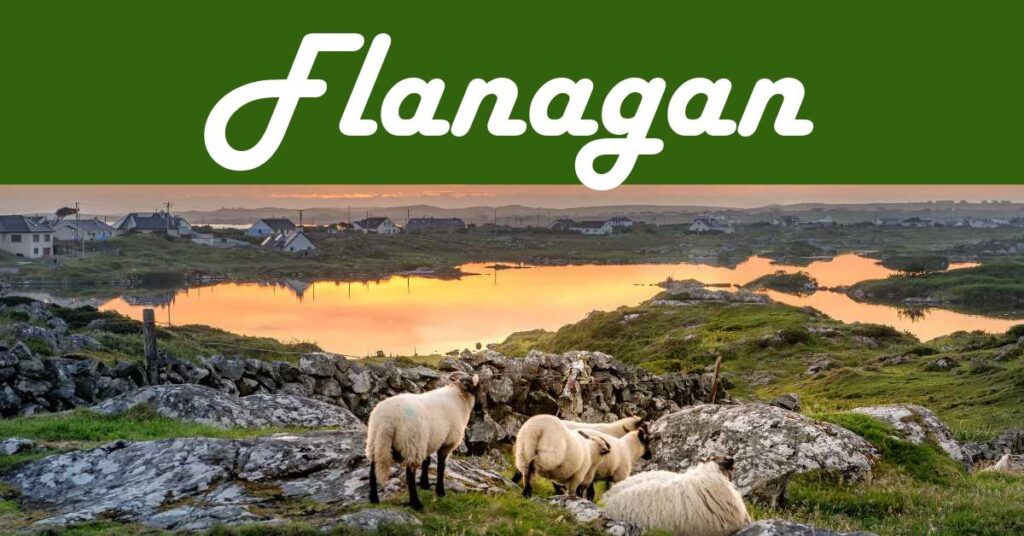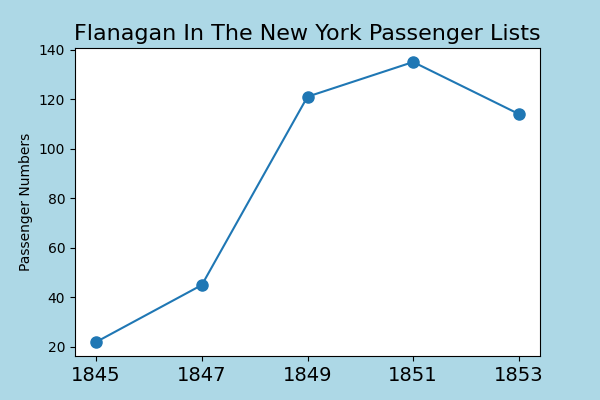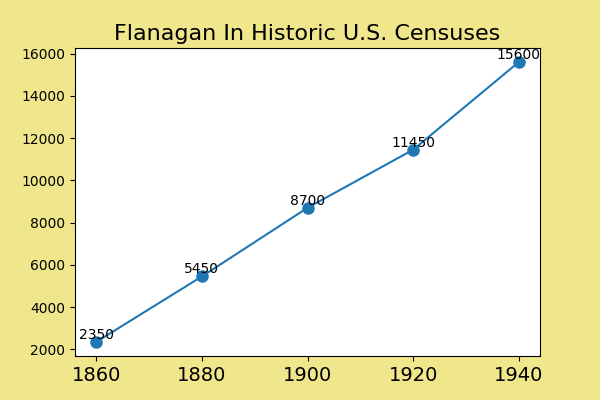This article looks at how common Flanagan is as a last name in Ireland and the United States from the 19th century to the present day.
You’ll learn the meaning and origins of the Flanagan surname while exploring some notable and famous people that held it.
I use census records, emigration lists, and military archives to uncover fascinating patterns. If you’re studying your genealogy, check out my sources at the end of the post so you can do your own research.
How Common Was Flanagan In Ireland In The Early 1900s?

The only full censuses that are publicly available in Ireland are from 1911 and 1901. Prior decades were either destroyed through government action (to reclaim storage space) or by a catastrophic fire during the Irish Civil War.
So, we’ll focus here on the early decades of the twentieth century.
I used online archives to calculate the total numbers by surname. I consider these estimates due to some percentage of transcription errors. So, I’ve rounded the numbers to the nearest fifty.
There were 7,750 residents named Flanagan on the island in 1911.
Ten years earlier, Flanagan had about 6,750 residents in the 1901 census.
Population Estimates In The 1890s
A study of Irish surnames was conducted in 1890 by the head of the Civil Registrations Office. It was published as a “Special Report on Surnames In Ireland.”
The survey estimated that there were about 9,800 people named Flanagan in the country.
Emigration To America After The Irish Famine
The Irish diaspora is large and widespread with a significant number of people emigrating to other parts of the globe. The destinations traditionally have been England, the U.S., Canada, and Australia. Emigrants were driven by various factors like political unrest, poverty, and food scarcity.
The largest wave of emigration to the United States occurred during the 19th century. The peak was in response to the Great Irish Famine, which took place between 1845 and 1852. A plant disease devastated the main food and income crop for much of the population.
I reviewed the Flanagan name in the shipping passenger lists arriving in New York during this period. The departures were from both Ireland and England.
This picture shows how the numbers rose and fell in the years after the famine:

How Common Is Flanagan In The U.S.?
Based on the 2010 U.S. census, the name Flanagan ranks about 1,151 among Irish names in America with 30,887 bearers.
Although the 2010 census has exact numbers and rankings, the rank I assign here is my estimate. If you’re curious about how I got there, here’s a brief explanation…
Estimating Rank In The United States
Historically, some Irish families with Gaelic surnames took English-sounding names as translations under the influence of colonization.
As these names also have English origins, they will have been brought to the United States by both British and Irish immigrants. Because the census doesn’t ask about specific European origin (e.g. England vs Ireland), it’s impossible to identify the proportion with Irish heritage.
I reviewed the census to identify which names are predominantly Irish in origin. In order to estimate the relative rankings of “Irish” names, I’ve mostly excluded surnames that have varying origins.
Flanagan In Historic Times
It’s interesting to look at how the numbers of a surname change over time in a relatively young country like the United States. These changes can reflect the broader demographic shifts within the nation. It’s not just migration from outside. It’s also birth rates, improved child mortality, and people living longer.
The historic census records have been transcribed and digitized. I used online archives to run counts of surname populations.
But the totals can’t be exactly accurate due to transcription errors. So, I’ve rounded the numbers to the nearest 50 in the graph below.
This picture shows the numbers every twenty years from 1860 to 1940:

These are the numbers in the graph:
- 1860: 2,350
- 1880: 5,450
- 1900: 8,700
- 1920: 11,450
- 1940: 15,600
Flanagan In World War II
About 8.3 million men and women enlisted in the U.S. Army during the Second World War. Many were of Irish heritage, and some were born in Ireland.
There were registration records for 1,217 soldiers named Flanagan who enlisted between 1938 and 1946.
There were 20 who were born in Ireland.
Flanagan Surname: Meaning And Origin
Flanagan comes from the Gaelic surname Ó Flannagáin, which means “descendant of Flannagán”.
The personal name Flannagán is derived from “flann”, which is a Gaelic word for red. The suffix (“agán”) is the pet form of the name. So, the full name is akin to “descendant of the dear little ruddy person”.
There were several distinct early families with the name in Ireland. Flanagans were lords in what is now County Westmeath in the midlands of the country. Another family were chiefs in the northwest of Waterford.
Famous Or Notorious Flanagans
Here are some notable people with the family name:
- Edward J. Flanagan (1886 – 1948): emigrated from County Roscommon in 1904 to the United States where his brother was a priest. Fr Flanagan was ordained in 1912. He founded Boys Town, a complex for orphaned and troubled youths.
- De Witt Clinton Flanagan (1870 – 1946): a New Yorker who was elected to the U.S. House of Representatives in 1902. He later led the construction of the Cape Cod Canal.
Sources
External Research
The Ireland 1990s estimates are from Seán J. Murphy’s research paper.
The population estimates of 1890 are based on the “Special Report on Surnames in Ireland“, published in 1909.
The population figures for the 2010 U.S. Census come from a file provided by the U.S. Census Bureau.
Internal Research
Some of the population numbers are based on my own research and calculations using online archives. I’ve rounded those numbers to the nearest 50 to account for transcription errors and other technical issues with online databases of this type.
The Irish census estimates for 1901 and 1911 are my calculations based on the Irish National Archives
I plotted the emigration figures from 1845 to 1854 based on calculations from the archives of the New York Passenger Lists (1820-1957).